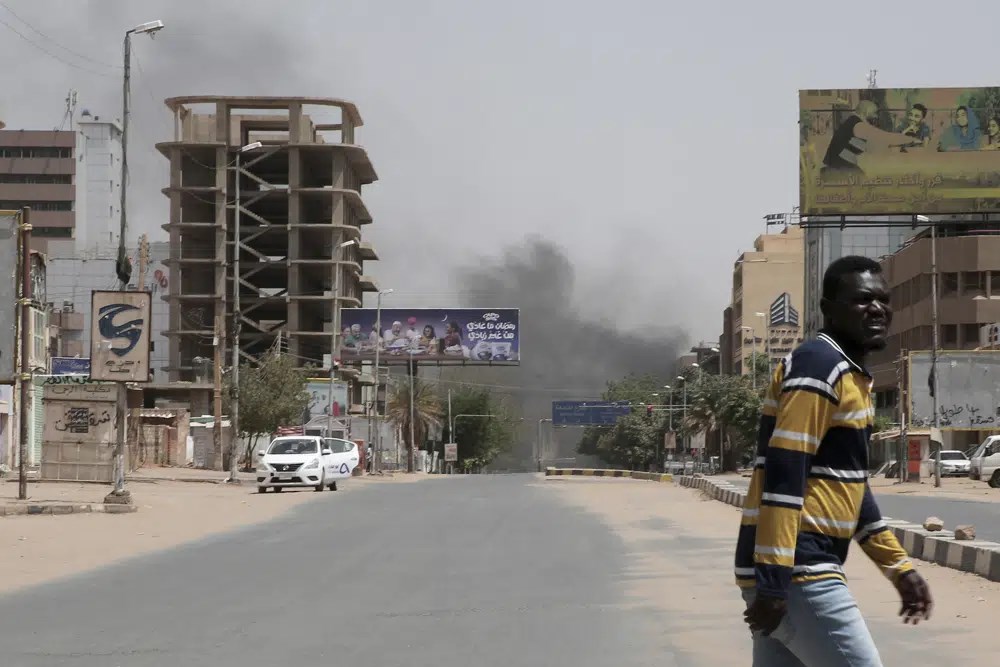No breakthrough yet in Sudan talks, as clashes continue
A Saudi diplomat assures that Sudan's warring generals are discussing the "security measures they should take in order to facilitate the delivery of urgent humanitarian aid" in pre-negotiations talks.
-

Smoke is seen rising from a neighborhood in Khartoum, Sudan, Saturday, April 15, 2023. (AP)
Ceasefire talks in Saudi Arabia between Sudan's warring generals have offered "no major progress" so far, a Saudi official said as quoted by AFP on Monday, diminishing hopes for a swift end to the clashes, as loud explosions again rocked greater Khartoum on Wednesday, with fighting between Sudan's warring generals showing no let-up.
"We were woken by explosions and heavy artillery fire," one resident of Khartoum's sister city of Omdurman told AFP.
Sudan's army chief Abdel Fattah Al-Burhan and his deputy-turned-rival Mohammed Hamdan Dagalo, who heads the paramilitary Rapid Support Forces (RSF), sent representatives to the Red Sea coastal city of Jeddah on Saturday for meetings that were described as "pre-negotiation talks".
Goals include reaching "an effective short-term halt" to the fighting, facilitating aid delivery, restoring basic services, and setting "a timetable for expanded negotiations to reach a permanent cessation of hostilities," as per the Saudi Foreign Ministry's statement released on Monday.
The two sides have "begun to discuss the security measures they should take in order to facilitate the delivery of urgent humanitarian aid and the restoration of essential services," the statement added.
But a Saudi diplomat said, as quoted by AFP on Monday, that "no major progress is achieved so far."
"A permanent ceasefire isn't on the table. Every side believes it is capable of winning the battle," the diplomat added.
The talks "will continue in the following days," the Saudi Foreign Ministry said, without identifying a clear timeline.
UN top humanitarian official Martin Griffiths arrived in Saudi Arabia Sunday for ceasefire talks between Sudan's warring generals, as gun battles and airstrikes flared in the Sudanese capital at the start of a fourth week of fighting.
Multiple truce deals have been declared and quickly violated since battles erupted between the Sudanese army and the Rapid Support Forces (RSF) on April 15.
Numerous warnings of a "catastrophic" humanitarian disaster have been issued in response to fierce warfare that has killed hundreds, injured thousands, and caused numerous warnings.
Read more: UN admits failure to stop Sudan war, clashes ongoing despite truce
Sudanese war displaced double to more than 700,000: UN
The United Nations said on Tuesday that the effects of the conflict between Sudan's generals are becoming increasingly harsh for civilians, with the number of people displaced from their homes doubled in the previous week.
At least 16 people were killed in separate ethnic skirmishes in the country's south, and a significant group in the east—which has been unscathed by the war thus far—demonstrated support for the army.
More than 700,000 people are now internally displaced by battles since April 15, as per the International Organization for Migration.
"Last Tuesday, the figure stood at 340,000," the UN agency's spokesperson, Paul Dillon, said in Geneva.
An increasing number are also crossing borders to flee the clashes.
Fighting has been condensed in the capital Khartoum but other areas, most notably the western Darfur region bordering Chad, have also seen heavy fighting.
On Monday, the UN Agency for Refugees said 150,000 Sudanese had fled to nearby nations.
In a nation where, according to the UN, almost one-third of the population needs humanitarian aid even before fighting began, those left behind in the battle zones suffer from shortages of water, energy, food, and medical care.
Thousands more people have left under foreign leadership during evacuations by land, sea, and air; many went through Port Sudan on the Red Sea, which has so far remained peaceful.
Conflict transcends borders
State media reported on Tuesday deadly fighting in Kosti, the White Nile state capital and last major town on the road from Khartoum leading to South Sudan.
According to the state-run SUNA news agency, violence between the Hausa and Nuba ethnic groups on Sunday resulted in the deaths of 16 people, the injuries of dozens more, and the imposition of a regional nighttime curfew.
The humanitarian situation in Sudan has been deemed catastrophic by the UN.
According to a UN spokesperson on Monday, there has been "large-scale looting" of assistance institutions, most notably at the World Food Programme in Khartoum over the weekend.
Assuring Sudanese that their savings are untouched, Sudan's banking federation announced on Tuesday that "certain banks in Khartoum" have also been robbed.
Concerns have grown over the conflict's effect on South Sudan, whose oil is exported through its northern neighbor.
Hanna Tetteh, United Nations' special envoy for the Horn of Africa, told the Security Council that more than 200,000 South Sudanese refugees hosted by Sudan could potentially return south, "if we do not see stability returning soon".
Read next: Sudan: A borderless conflict

 5 Min Read
5 Min Read









